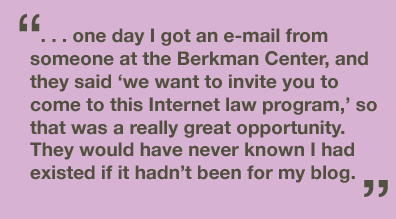
Blogs as Scholarly Activities
C: I've had quite a few opportunities career-wise because of my blog; one is that I was invited to participate in the Internet Law program in 2004. This is the Berkman Center for Internet and Society through Harvard, which is a project through Harvard Law School. Every year the Berkman Center offers this program, and one day I got an e-mail from someone at the Berkman Center, and they said "we want to invite you to come to this Internet law program", so that was a really great opportunity. They would have never known I had existed if it hadn't been for my blog.
Writing about copyright and intellectual property--I've done a little of that on my blog, but also the Institute for the Future of the Book is a project of the Annenberg School for Communication at the University of Southern California; they have invited me to do a few different things. One was they flew me out to Los Angeles to participate in this meeting which is through one of their projects through next/text. Next/text is an initiative where people talk about textbooks and what people are doing in terms of online textbooks, and it's the Institute for the Future of the Book. They want to know what textbooks are going to be like in the future. Again, they wouldn't have known I'd existed if it hadn't been for my blog. Also, MediaCommons is another project that is similar to Future of the Book, and they invited me to be on the editorial board and that was because of my blog, too. There are other opportunities as well; I've been actually invited to be a reviewer for several different journals--some out of my discipline even because of my blog. 
Q: Is it primarily received traffic through your RSS feed? How did that work? It sounds like you weren't expecting it and then it happened.
C: I knew that a lot of people read it and linked to it, and you can find out who's linking to your blog by using Technorati with your referrers and everything, so I knew that CopyFight (a copyright and intellectual property blog) linked to me. The people at the Burkman Center might have found it that way. Institute for the Future of the Book, I'm not really sure how they found it, but if your blog is linked to a lot of different people...
Q: There are several points of entry I'm sure.
C: There are a lot of people who, mainly feminist bloggers who...I mean these are all overlapping so I have audiences: rhetoric and composition, gender studies, feminist theory, and people who do human-computer interaction, and just technology studies in general and so they overlap. I think the feminist theory and gender studies people said, "okay, we have this manuscript for this journal; will you review it?" I guess it's just a matter of reaching a lot of different audiences, and it's definitely a networking opportunity. I think a lot of people have made that point.
Q: Steve Krause's "Where do I put this on my CV?" talks about Scholarship big "S" vs. scholarship small "s". Scholarship being scholarship at a local institution that gives tenure and scholarship small "s" being scholarship that helps the field at large. How do you think blogs function as one or both?
C: That was a really good essay. I do put it on my CV, but I don't put it under a heading. I just put it under my contact information. So it's on there, but I don't try to make a case for it as anything. One thing that I disagree with, or something that I don't think is something to do--I don't want to count my blog entries as service, because I think it's a little more than that. Not that service is a bad thing, but I think that it's more important work for me than service. I think that the solution I've found is just having it on my CV as my contact information and not hiding it at all. Not putting it under publications and not putting it under service, but having all the things on the CV, because I have who knows how many lines on my CV that are a result of my blog. Like being a reviewer for this journal or that journal or the Berkman Center or the Institute for the Future of the Book stuff, that's all on my CV. I suppose if I wanted to, I could put my blog under a special heading and explain that it has given me all of these opportunities. I might do that in the future sometime, but it's not something I do right now.
Another thing is that a lot of people in their classes will assign readings for posts that I wrote on my blog. I've written a lot of seminar papers and put them on my blog or written shorter papers for classes, but I had a paper about blogging and public sphere and people have assigned that in classes about gender and blogs and blogging too. I used to keep really meticulous track of those, and I still do to an extent, but I don't put that on my CV. I think that it's important information just to keep track of. I don't know what I'll really do with this for tenure and promotion, but it's good to know what sort of reach you have and name recognition. I guess if I ever had to make a case for name recognition, I would have that data and those materials.
About Clancy
 Clancy Ratliff is an Assistant Professor of English and Director of First Year Writing at the University of Louisiana at Lafayette. She is a specialist in feminist rhetorics, digital media, modern rhetorical theory, technical communication, and intellectual property and authorship.
Clancy Ratliff is an Assistant Professor of English and Director of First Year Writing at the University of Louisiana at Lafayette. She is a specialist in feminist rhetorics, digital media, modern rhetorical theory, technical communication, and intellectual property and authorship.
Ratliff was awarded the Hugh Burns Best Dissertation Award by Computers and Composition in May 2007. The previous year, Kairos honored her with the John Lovas Memorial Academic Weblog Award.
Ratliff's recent publications include "Attracting Readers: Sex and Audience in the Blogsphere" in Scholar and Feminist Online (2007). Her work, "Weblogs with Creative Commons License" has been accepted for publication in the upcoming collection, Composition, Copyright, and Intellectual Property Law, edited by Stephen Westbrook.